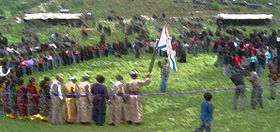Khigga

Khigga is a style of Assyrian folk dance in which multiple dancers hold each other's hands and form a circle. There are multiple foot patterns that dancers perform. Its thought to have been danced for thousands of years. It is usually performed at weddings and other joyous occasions.[1]
Background

Khigga is traditionally danced with music played on the zurna, supported by a davul, but in recent years, electronic instruments have started to replace them.
The khigga has spread from Anatolia to many other regions, such as Armenia and the Balkans. The khigga is a group of traditional hand-holding dances similar to those from the Balkans and Eastern European countries, with a single or a couple of figure dancers often added to the geometrical centre of the dancing circle.
In Assyrian weddings, as well as parties and other various social gatherings, people may dance khigga for hours. Every region has its own style and forms. Khigga is simple to dance and it is the first beat that is played in welcoming the bride and groom to the reception hall.
Technique
As with most Assyrian folk dances, khigga assumes an open circular shape. In a restricted floor space (e.g. a lot of tables), the dance tend to wind over the room and assume spiral, circular and curvy shapes.
Arms are predominantly used which usually move independently of the legs. Arm motions include bouncing, swinging forward and back, moving side-to-side. The torso, along with the shoulders and arms, bounces up and down rhythmically, often independently of the legs. Stomps and stamps are also present.
Khigga has other sub-styles such as "Heavy Khigga" or "Normal Khigga". Heavy simply means the same dance beat but slower. Khigga goes by the time signature of 4
4 and tempo between 100 and 115.
The head of the khigga line, referred to as "resha d'khigga" (ܪܝܫܐ ܕܚܓܐ), usually dances with a yalekhta (ܝܠܚܬܐ), or a handkerchief with beads and bells added to the sides so it jingles when shaken. A Yalekhta can have many different designs on the piece of cloth. A "copala" (ܟܘܦܠܐ), or decorated cane, is also used at many Assyrian weddings.
See also
- Kochari
- Dabke
- Syrtos
- Horon
- Hora
- Kolo
- Tamzara
- An Dro
- Yalli
- Music of Iraq
- Culture of Iraq
- Music of Syria
- Culture of Syria